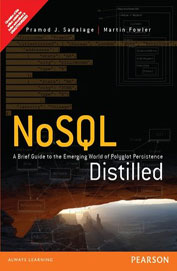
The need to handle increasingly larger data volumes is one factordriving the adoption of a new class of nonrelational "NoSOLdatabases. Advocates of NoSOL databases claim they can be used tobuild systems that are more performant, scale better, and areeasier to program. NoSOL Distilled is a concise but thoroughintroduction to this rapidly emerging technology. Pramod J.Sadalage and Martin Fowler explain how NoSOL databases work and theways that they may be a superior alternative to a traditionalRCIBMS. The authors provide a fastpaced guide to the concepts youneed to know in order to evaluate whether NoSOL databases are rightfor your needs and, if so, which technologies you should explorefurther. The first part of the book concentrates on core concepts,including schemaless data models, aggregates, new distributionmodels, the CAP theorem, and map-reduce. In the second part, theauthors explore architectural and design issues associated withimplementing NoSOL. They also present realistic use cases thatdemonstrate NoSOL databases at work and feature representativeexamples using Riak, Mongo0B, Cassandra, and Neo4j. In addition, by drawing on Pramod Sadalage's pioneeringwork, N050! Distilled shows how to implement evolutionary designwith schema migration: an essential technique for applying NoSOLdatabases. The book concludes by describing how NoSOL is usheringin a new age of Polyglot Persistence, where multiple data-storageworlds coexist, and architects can choose the technology bestoptimized for each type of data access. About the Author PRAMOD J. SADALAGE , Principal Consultant at ThoughtWorks,enjoys the rare role of bridging the divide between databaseprofessionals and application developers. He regularly consultswith clients who have particularly challenging data needs requiringnew technologies and techniques. He developed pioneering techniquesthat allowed relational databases to be designed in an evolutionarymanner based on version-controlled schema migrations. With

